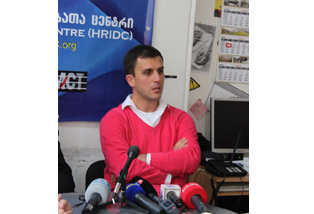Gela Mtivlishvili, Information Center of Mtskheta-Mtianeti
In the morning of May 20 I went to Tianeti to work on a news story. The day before, I got a phone call and was told that social benefits had been cancelled for some Georgian Dream supporters after they had met with the coalition’s leaders. Additionally, a father and his son – the Shushanashvilis – had been held at the police station for four days, and reports said that interrogators intimidated and threatened the two.
The manager of Georgian Dream’s Tianeti office, Rusudan Sisauri, showed me the way to the Shushanashvilis’ house. Mevlud Shushanashvili told me the story: the investigator had told him that if he stopped cooperating with Georgian Dream, all his problems would be resolved; otherwise he would have to pay a fine of 5 000 GEL and a five-year conditional sentence would be imposed on him.
Having interviewed the Shushanashvilis, I was about to leave for the Doreulebi village to interview another victimized family; on my way to the village I decided to take photos of the Tianeti district police station. I was taking photos of the building from a distance of 50 meters. I had parked the car close to the entrance of the Church in the center of Tianeti. A man standing on the police station stairs waved his hand at me and shouted to come closer. I did not obey his order and he started heading towards me. He was in plain clothes and requested me to show my documents; I asked him what his name was, but he only insisted on seeing my documents. I told him I was a journalist from the Information Center of Mtkhesta-Mtianeti and requested that he introduce himself and explain why he wanted to see my documents.
I was video-recording our conversation. He called somebody and said “Giorgevich, he is still shooting, what shall we do?” Apparently, he received instructions from Giorgevich (presumably the head of district police) to seize [the camera] from me, to drag me to the police station and put me in a cell, because the stranger attacked me and tried to seize the camera. I repeatedly asked him not to touch the camera and tried to put the camera in my car. Suddenly, two police officers joined him; they grabbed me and dragged me toward the police station. I kept asking them to explain why they were arresting me; meanwhile they seized my camera. As soon as they took me inside the police station, the stranger in plain clothes kicked me in the stomach twice and somebody hit me in the head too. I still have a headache from the assault but I did not see who and what hit me in the head. The other police officers did not assault me.
Inside the police station, the officers, following the instructions of the stranger in plain clothes, ordered me to sit on a chair and not move. Later I found out that the stranger in plain clothes was the deputy head of the Tianeti police department, officer Mamuka. Mamuka instructed the police officers to find someone who knew how to work a camera. That person arrived fifteen minutes later. Meanwhile, I asked for permission to call a lawyer and requested an explanation for why I was being detained. Having called Giorgevich, Mamuka shouted at me that I had been arrested for resisting police officers. I repeated my request to contact a lawyer and asked them to give me my cell-phone but they replied that they would invite a lawyer when that was necessary. Ten minutes after I entered the police station, the landline phone was ringing constantly; I do not know who was calling there but the officer on duty answered in the following way: “The detainee is in the police station and I can connect you with Mamuka in a minute.” I tried to get up from the chair several times but the police officers told me not to create problems for them by moving from the chair.
Thirty minutes later I requested to go to the toilet. Mamuka shouted to the police officers from his room upstairs not to allow me to go to the toilet; several minutes later when I started complaining loudly about inhuman treatment, Mamuka again shouted and asked them to accompany me to the toilet, stand in the door and not allow me to lock the door. By now, forty minutes had passed after my being apprehended. The police officers started taking photos of me; of course I protested and demanded that they show me the administrative protocol on my detention, I also repeated my request for meeting with a lawyer. I told them they were restricting my right to legal representation and Mamuka started laughing at me.
Several minutes later, I started feeling sick because of nervousness and stress. I requested water and to see doctor. After a five-minute negotiation, a police officer called for an ambulance. Before its arrival, I repeatedly requested that the officers return my cell-phone and call a lawyer. As soon as the ambulance arrived, but before doctors entered the police building, Mamuka came downstairs, grabbed me by the shoulders and pushed me outside the building all of suddenly; nobody had ordered me to leave the police station in advance.
Outside the police station, I needed the assistance of the medical emergency personnel. The doctors took me to the Tianeti district hospital where I was given medical assistance.
Rusudan Sisauri later told me that after my release, a police officer put my camera back into my car. The photos and video- footage of the incident - materials which showed the violence, arbitrary detention and inhuman treatment I had suffered at the hands of the deputy head of the Tianeti police department – had been erased from the camera.




